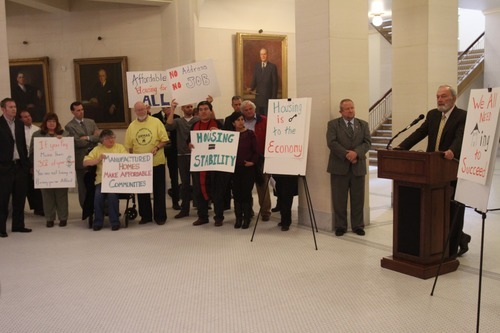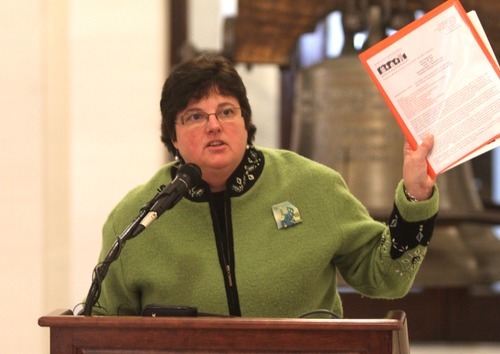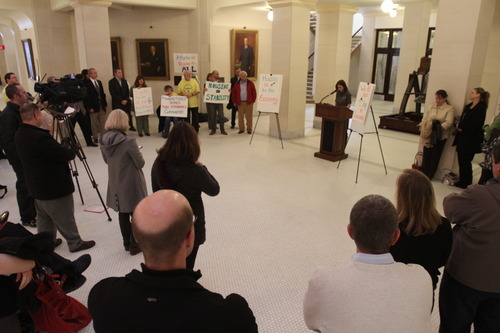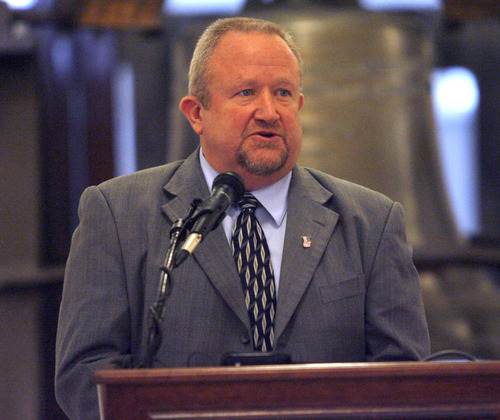This is an archived article that was published on sltrib.com in 2012, and information in the article may be outdated. It is provided only for personal research purposes and may not be reprinted.
Doubled up families, overflowing homeless shelters, empty nesters and senior citizens who want to downsize but don't have adequate housing options.
Their situations are varied, but the solution is not: Utah has a critical need for affordable housing, according to advocates who on Wednesday urged lawmakers and their local government counterparts to put that need "at the forefront of their decision making."
"We believe everyone deserves a safe, affordable place to live," said Tara Rollins, executive director of the Utah Housing Coalition, but "the cost of housing in Utah has far exceeded income."
Housing has been left off policy and planning agendas for too long and the new year offers a fresh opportunity to rethink how to meet this basic need, which has been exacerbated by a lengthy recession and stalled recovery, according to Rollins and others who spoke at the Capitol.
In Utah, the fair market rent for a two-bedroom apartment is $769 a month; to afford that rent — without spending more than a recommended 30 percent of income on housing — a household must earn $14.80 an hour, or $30,775 a year. The National Low Income Housing Coalition said the average renter in Utah earns $11.38 an hour, which is enough to afford monthly rent of just $592 a month.
But many Utahns — nearly 86,000 as of November — are still struggling to find jobs, which makes meeting housing costs a challenge. That's led to an increase of families at Utah's homeless shelters and to many families doubling, tripling and even quadrupling up, said Mayor Russ Wall of Taylorsville. And that impacts schools, city services and even issues like too many cars parked on a street.
In September, the Census Bureau reported doubled up households had increased 10.7 percent nationally since the start of the recession in 2007. Many of those households include 25- to 34-year-olds who have moved back in with their parents.
Cheri Jacobson hears about such households often — from children worried about their own family's situation.
"You'll have students tell you, 'Please don't tell anybody. Please don't tell the landlord, or we'll get kicked out,' " said Jacobson, a teacher and homeless education liaison for the Granite School District.
Meanwhile, efforts to increase Utah's affordable housing supply have stalled along with the rest of the state's construction industry, said Jim Wood, director of the Bureau of Business Research at the University of Utah. The state is in the sixth year of the worst housing "contraction" Utah has ever experienced, he said, with new construction starts at the same level as in the 1950s.
"It's been devastating for the industry and for those who work in that industry," Wood said.
The decline in home ownership has increased the ranks for renters, who now total some 60,000 statewide and who "need affordable rental units, and those are hard to come by," he said.
Meeting Utah's affordable housing need
Despite cuts in federal funds, Utah continues to increase the state's affordable housing options via the Olene Walker Housing Loan Fund and Utah Housing Corp. Both help first-time home buyers and developers of affordable rental housing. But the Division of Housing and Community Development estimates an ongoing need for 9,000 new rental units yearly to meet demand. There are another 14,000 units in need of rehabilitation, said Gordon Walker, division director.
To meet the need, affordable housing advocates said lawmakers and local government officials need to:
• Adopt policies that encourage the flow of capital into Utah for affordable housing projects
• Support energy efficient housing, which reduces utility costs and thus cuts expenses
• Adopt zoning regulations that allow accessory apartments, ideal for doubled up and multi-generational households
• Ease zoning restrictions and approval processes to accommodate high-density housing
• Address the "incredible" need for senior citizen housing
• Consider affordable housing a necessary component of job development









